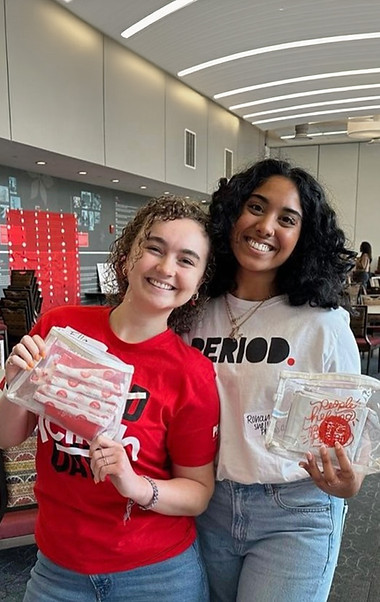WE BELIEVE: WASH CAN CHANGE THE WORLD.
While people in most regions of Europe can just turn on the tap for clean water in everyday life, millions of people worldwide have to deal with water scarcity, have no access to potable water, let alone sanitation, and have to live with unpredictable hygiene risks every day.
The lack of WASH infrastructure has a direct negative impact on people's health and their entire lives. The interrelationships are complex and show how important it is to always see the topic of provision as a cycle. Or to look at it from a different perspective: Isn't it fascinating what can change when access to water, sanitation and hygiene is guaranteed?


WASH IS A HUMAN RIGHT.
In 2010, the United Nations General Assembly adopted the right to access to clean water, thus underlining the vital importance of the resource. Without water, safe sanitation and hygiene, people are also deprived of other fundamental rights.
INDIA: A COUNTRY THAT IS CLOSE TO OUR HEARTS.
On the one hand, pulsating metropolises, and technology centers. On the other hand, regions where there is hardly any access to safe and clean water. On one side, an incredible wealth of culture and tradition; on the other, a great need to catch up in terms of sanitary infrastructure and wastewater management.
India is a country between worlds. It is a country full of contrasts, but at the same time full of energy. Always on the move, always with a goal in mind, and therefore a region that offers many starting points for effective foundation work. Although great progress has been made in the field of WASH over the last 10 years, there is still much to be done. For example, 90 percent of all wastewaters from households and industry returns untreated to the water cycle. A sensitive issue when it comes to the health of the most populous nation on earth. At the same time, there is also the opportunity to significantly improve the quality of life of the population with innovative technological solutions and local expertise, for example through filtration and the treatment of wastewater.




WASH INSTITUTE: NEW METHODS OF SEPTAGE TREATMENT.
India is a huge country in which it will simply never be possible to connect all towns to a centralized sewage system.
Accordingly, innovative ways are needed to provide the population with access to safe treatment and disposal of on-site sanitation systems. With the support of Viega Foundation, WASH Institute is deploying Mobile Septage Treatment Units (MTU) in the southern Indian states of Tamil Nadu and Kerala to help marginalized households in desludging their septic tanks.
Left: The WASH Institute truck in action: an employee in protective gear stands next to a resident whose septic tank has been emptied.

DASRA:
INCLUSIVE SANITATION FOR THE NORTH-EAST OF INDIA.
India has a vast and varied geographic, economic and social landscape, which varies from region to region. While there has been significant progress at the National Level to further safe sanitation outcomes there is a need to evolve from a one-size-fits-all approach to a more contextualised solution for the state’s population, sanitation budget and infrastructure and existing political commitment.
This is where the organization DASRA, officially Impact Foundation, which we support, comes in. It transforms knowledge, which has already been acquired in other states in India, into an effective lever in regions where resources and technological know-how are (still) lacking.
Left: Two sanitation workers in protective clothing stand at a truck pumping out wastewater.

YUVA UNSTOPPABLE: SMART IDEAS ARE MAKING HEADWAY IN GUJARAT.
YUVA cannot be stopped. Because the organization is convinced: If you want to have a positive impact on India's future, you have to start with the people who will be its architects – children and young people.
In Gujarat, for example, the issues of water and sanitation are crucial for the development of their potential. YUVA uses smart measures and technologies to ensure that significantly fewer girls and boys drop out of school.
Left: Boys sitting in the schoolyard of a primary school where YUVA is working.



USA - THE LAND OF UNLIMITED CONTRADICTIONS.
Many may be surprised: Despite a high standard of living and extensive rights, not everyone in the USA has safe access to clean drinking water and hygiene products.
Numerous US regions are not connected to the public water supply. In many places, thousands of people have to decide every month whether to buy food for their family or period products since they do not have enough money for both. There is not enough support from the government here - which leads to serious disadvantages in terms of equality, participation and health.
This is why we are also active in the USA and support WASH projects that help people to lead a healthy life in dignity.

PERIOD. INC.: EDUCATION TO COMBAT PERIOD POVERTY
Without period products, there is no equal participation in society. Because people who can’t access or afford menstrual products may stay away from school or work or be unable to fully participate in life’s activities.
PERIOD. aims to defeat “period poverty” through service, education and advocacy throughout the USA and their chapters around the world. At government level, the activists campaign for the abolition of taxes on period products. The organization also educates young people about menstrual health, and distributes free menstrual products to those in need.
PERIOD. was founded in 2014 by two students and has since become one of the largest US organizations in the field of menstrual equity and education.
Left: In 2023 alone, PERIOD. distributed over 23,000 reusable period products.
COURAGE IS AT THE BEGINNING OF AN ACTION, HAPPINESS AT THE END.
DEMOCRITUS







